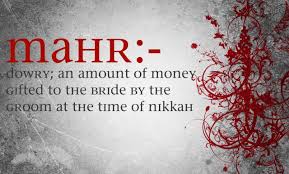Definition of Dower
Mahr or dower is a sum of money or offer property which the wife is entitled to receive from the husband in consideration of the marriage.[2]
Mahr or dower is a sum that becomes payable by the husband to the wife on marriage either by agreement between the parties or by operation of Law. It may either be prompt or deferred.
According to Wolson, “Dower” is a consideration for the surrender of person by the wife. It is the technical Anglo- Mohammedan term for its equivalent “Mahr” in Arabic.
According to Ameer Ali, “Dower” is a consideration which belongs absolutely to the wife.
According to Dr. Jung defines, “Dower” as the property or its equivalent, incumbent on the husband either by reason of being agreed in the contract of marriage or by virtue of a separated contract, as special consideration of Buza, the right of enjoyment itself.[3]
According to Baillie, “the property which is incumbent on a husband, either by reason of its being named in the contract of marriage, or by virtue of the contract itself. Dower is not the endanger or consideration given by the man to the women for entering into the contract; but an effect to the contract imposed by the law on the husband as a token of respect for its subject, the women.[4] In order to constitute a valid marriage, the Mohammedan law requires that there should always be a consideration moving from the husband in favour of the wife, for her sole and exclusive use and benefit. This consideration is called mahr or sadak in legal treatises and in common parlance dain mahr.
The principle of ante nuptial settlements is not peculiar to the Mohammedan law. Sautayra thinks that the custom originated in ancient times with the payments which the husbands often made to their wives as a means of support and as a protection against the arbitrary exercise of the power of divorce.[5]
The above opinions are based on the argument that marriage is a civil contract and dower is a consideration for the contract. But it is submitted that the above opinions are erroneous, because even in those cases where no is specified at the time of marriage, marriage is not void on that recount, but the law requires that some dower should be paid to the wit. Abdur Rahim correctly observes, “It is not a consideration preceding from the husband for the contract of marriage, but it is an obligation imposed by the law on the husband as mark of respect for the wife as is evident from the fact that the non- specification of dower at the time of marriage does not affect the validity of marriage.[6]
Root or Custom of Dower
Dower in the present form was introduced by the prophet Mohammad and made obligatory by him in the case of every marriage. “Dower” in Muslim law is somewhat similar to the demotion proper nuptials in Roman law. The important difference however, is that while under the Roman law it was voluntary, and under the Muslim law it is absolutely obligatory. The following points may be noted with respect to the nature of Dower.
Analogy is often drawn between a contract for dower and one for sale. The wife is considered to be the property and the dower her price.
In Abdul Kadir v. Salima, [7] Mahmood. J., comparing the marriage and dower with contract for sale and consideration, says “Dower may be regarded as consideration for connubial intercourse by way of analogy to the contract for sale. The right to resist her husband so long as the Dower remains unpaid is analogous to the lien of a vendor upon the sold goods while they remain in his possession and so long as the price or any part of it is unpaid and her surrender to husband resembles the delivery of the goods to the vendee.
It is regarded by some eminent authorities as a consideration for conjugal intercourse. In the case of Smt. Nasra Begum v. Rigwan Ali, Allahabad High court expressed the view that the right to claim prompt dower proceeds cohabitation.[8]
Dower is an essential incident and fundamental feature of marriage with the result that even if no dower is fixed the wife is entitled to some dower from the husband. The marriage is valid even though no mention of dower made by the contracting party. In Hassina Bibi v. Zubaida Bibi, [9] the Judicial committee held that- “Dower is an essential incident under the Muslim law the status of marriage, to such an extend this is so that when it is unspecified at the time the marriage is contracted, the law declares that it must be adjudged on definite principles.
Regarded as a consideration for the marriage, it is in theory payable before consummation but the law allows its division into two parts, one of which is called “Prompt” payable before the wife can be called upon to enter the conjugal domicile or demanded by the wife the other deferred, payable on the dissolution of the contract by the death of either of the parties or by divorce. But the dower ranks as a debt and the widow is entitled along with other creditors of her deceased husband, to have it satisfied on his death out of his estate”. If the property of her deceased husband is in her possession, she is entitled to retain the possession, until her dower is satisfied. Heirs may recover that property after they have paid up her debt. Dower-debt is not a charge and widow cannot prevent another creditor or of her husband from recovering his debt from his estate. Dower-debt is an unsecured debt ranking equally with other debts.[10]
Islam insists that dower should be paid to the wife herself. It sought to make dower into a real settlement in favour of the wife, a provision for the rainy day and socially, a cheek on the capricious exercise by the husband of his almost unlimited power of divorce.
A husband thinks thrice before divorcing a wife when he knows that upon divorce the whole of the dower would be payable immediately.
If dower be regarded as sale price, it must be paid to the father or the guardian of the wife, since it is paid to the wife herself, it cannot be the price. It is a token of respect.[11]
Classification of Dower
Broadly, there are two kinds of dower:
(i) specified and
(ii) unspecified.
Specified Dower
Specified dower is that dower which is fixed at the time of marriage or later on. There are provisions relating to dower under sections 13, 14, 15, 16 and 20 of the Kabinnama [Form-E] according to the Muslim Marriages and Divorces Rule 1975. When a husband agrees to pay to his wife a residential building or one lakh taka as mahr, it is an example of specified mahr.[12]
The specified dower has been further divided into-
(a) prompt and
(b) deferred.
Prompt Dower (Muajjal Mahr)
It is payable immediately after marriage on demand. According to Ameer Ali, a wife can refuse to enter into conjugal domicile of husband until the payment of the prompt dower. The following point must be noted regarding prompt dower: Prompt dower is payable immediately on the marriage taking place and it must be paid on demand unless delay is stipulated for or agreed. It can be realized any time before or after the marriage. The wife may refuse herself to cohabit with her husband, until the prompt dower is paid. If the wife is minor, her guardian may refuse to allow her to be sent to the husband’s house till the payment of prompt dower. In such circumstances, the husband is bound to maintain the wife, although she is residing apart from him.
It was held in Rehana Khatun v. Iqtider Uddin, that the prompt portion of the dower may be realized by the wife at any time before or after consummation.[13] In the case of Mahadev Lal v. Bibi Maniran[14] it was decided that prompt dower does not become deferred after consummation of marriage, and a wife has absolute right to sue for recovery of prompt dower even after consummation. Dower which is not paid at once may, for that reason, be described as deferred dower, but if it is postponed until demanded by the wife it is in law prompt dower.
It is only on the payment of the prompt dower that the husband becomes entitled to enforce the conjugal rights unless the marriage is already consummated. The right of restitution arises only after the dower has been paid.
As the prompt dower is payable on demand, limitation begins to run on demand and refusal. The period of limitation for this purpose is three years. If during the continuance of marriage, the wife does not make any demand, the limitation begins to run only from the date of the dissolution of marriage by death or divorce.
Although prompt dower, according to Muslim law, is payable immediately on demand, yet, in a large majority of cases it is rarely demanded and is rarely paid, in practice a Muslim husband generally gives little thought to the question of paying dower to his wife save when there is domestic disagreement, or when the wife presses for payment upon the husband’s embarking upon a course of extravagance and indebtedness without making any provision for the lapse of time since marriage raises no presumption in favour of the payment of dower.
Deferred dower
It is payable on dissolution of mariage either by death or divorce. According to Ameer Ali generally in India dower is a penal sum with the object to compel husband to fulfill marriage contract in its entirety. The following points must be noted regarding deferred dower:
Deferred dower is payable on dissolution of marriage by death or divorce. But if there is any agreement as to the payment of deferred dower earlier then such an agreement would be valid and binding.
The wife is not entitled to demand payment of deferred dower, but the husband can treat it as prompt and pay or transfer the property in lieu of it such a transfer will not be void as a fraudulent preference unless actual insolvency is involved. The widow may relinquish her dower at the time of her husband’s funereal by the recital of a formula. Such a relinquishment must be a voluntary act of the widow.
The interest of the wife in the deferred dower is a vested one and not a contingent one. It is not liable to be displaced by the hampering of any event, not even on her death; as such her heirs can claim the money if she dies.
If the Kabinnama, the marriage contract deed, fixes the amount of dower but fails to show what portion of it will be prompt and what deferred dower, according to Allahabad and Bombay High courts the proportion between the two should be fixed on the basis of (i) position of the wife, (ii) custom of locality, (ii) total amount of dower, (iv) status of the husband.
Shia law- Under Ithna Ashari shia law if the Kabinnama fixes the total amount of dower but does not specify as to what portion of it will be prompt and what deferred, the whole of the dower is regarded as prompt.
In the Madras presidency, unless otherwise stipulated the entire dower is prompt no matter the parties are Shia or Sunni.
Sunni law- According to Sunni law, in the absence of any family usage and statement in kabinnama, half of the total amount is regarded as prompt and half as deferred.[15]
Proper dower (mahr-i-mithl)
Its size is to be detemined in view of the socio-economic conditions of the parties involved.
If no mahr has been agreed or expressly stipulated by the parties, the contract of marriage is still valid. This also means that if no mahr sum is specified in the marriage contract, the husband is not thereby released from his liability to pay a dower. Even a statement that no dower shall be paid does not change the position. In these circumstances, what is known as the ‘proper dower’ becomes due. It is worked out on the basis of the mahr agreed for women of a similar social status to the wife. Particularly relevant will be the mahr paid to other female members of the wife’s family, for instance sisters, paternal aunts and female cousins.[16]
There is no limit to the maximum amount of proper dower under the Sunni law, but under the Shia law the proper dower should not exceed 500 Dirham. 500 Dirham was the amount of dower which was fixed in the marriage of Fatima, the prophet’s daughter. In the Shia Muslims it is, therefore, considered a point of honour not to stipulate for a sum higher than the sum of dower fixed by the prophet for his daughter, Fatima.[17]
Distinction between Dower & Dowry
One should not confuse between dowry and dower. Dowry payments are not a part of Muslim Legal tradition, while the dower or mahr is an integral element of Muslim matrimonial law. Dowry payments have been outlawed and criminalized in south Asia, where they still are a huge legal problem Dowry not being an element of traditional Muslim law, where it occurs, it is part of customary traditions.[18]
A dower is a woman’s right to marital property. It is her right to receive a part of the husband’s income or estate if he dies in the course of the marriage. Dowry however, is the woman’s property that she brings into the marriage when she gets married. The dowry law no longer exists in most of the states. Dower is a sum of money receivable by the wife from the husband as a consideration for the marriage, whereas dowry is an extra dower consideration payable by one party to the marriage to another on the plea of bringing equality in marriage. Taking or paying or abetting payment of dowry has been made punishable.[19]
Subject matter or object of Dower
The subject matter of dower is not only confined to a sum of money or property; it includes personal services and other things. According to a tradition, Amir- bin- Rabia said, “that a woman of the tribe of Bani Fazarah married on a settlement of a pair of shoes, and the prophet said to her ‘Are you pleased to give yourself and your property for these two shoes: she said, ‘Yes’. Then the prophet approved of the marriage.’’
The followings were recognised as the subject of dower:
A handful of dates (Abu Daud).
A pair of shoes (Tirmizi).
If the husband is a slave, his services to his wife (Mohit Sarkhsee).
The services of the husband’s slaves to the wife (Fatawa-i Alamgir)
Husband’s services rendered to the guardian of a minor wife (Durrul Muktar).
Teaching Koran to the wife (Tradition).
In fact, the main contention of the Muslim Jurists is that anything which comes within the definition of meal can be the subject matter of dower. Thus, apart from the personal services of the husband, any profits arising from land or business, debts due to the husband, insurance policies, chooses-in-action, the sale proceeds of something, may constitute valid dower.
If the subject matter of dower be “an animal” or “cloth”, then the wife is entitled to mahr-ul-misl, proper dower because such dowers are invalid for uncertainty. Similarly, “a have” or “the land” without specifying the exact location and description are not fit subjects of dower, and the court will have to fix proper dowers in such cases.[20]
Contract of Amount of Dower in Marriage & Contract of Dower made by Father
The amount of dower may be fixed either before or after marriage[21] and can be increased after marriage.[22] It was held in Basir Ali v. Hafiz that the amount of dower may be entered into by the father of the bride.
The father of a minor son may make a contract on dower on his behalf and it would be binding on the son even if it was made after his marriage during the minority of the son. The father, if he acts as guardian for the marriage of his infant son, he is not personally liable unless he expressly becomes a surety for the dower stipulated. Otherwise the father only acts on behalf of the minor son and binds the latter and not himself personally. When a father enters into a contract of dower on behalf of his son, he makes himself a surety for due payment of dower in case his minor son has no means of paying it.[23]
Standard of Dower and Conditions or Terms of Payment
This may be divided into two-
- If the marriage is consummated, and is dissolved by death:
(a) Whole of the specified dower in case of regular marriage.
(b) Proper dower if unspecified in case of regular marriage.
(c) Specified or proper dower, whichever is less, in the case of irregular marriage.
- If the marriage is not consummated, and is dissolved by the act of party:
1. When divorced by the husband-
- Half of the specified dower, in case of regular marriage: in case of regular marriage.
- A present of three articles if unspecified: in case of regular marriage.
- When divorced by the wife: No dower.
- If the marriage is irregular in the weses and above: No dower.
Maximum & Minimum Amounts of Dower
The amount of dower or mahr varies in different countries; there is no fixed rule as to the maximum (mus’ab Settled a dower of 500,000 dirham or the granddaughter of Abu Bakre. The Prophet did not enunciate any fixed rule as to the amount of dower. He expressly left it to custom and local usages but as he appears to have settled 500 dirham upon Maimuna, the Shias consider that amount to be the mahr-i-sunnat. The Radd-ul-Muhtar says the dower of “our lady” Fatima was 400 dirham). It depends on the social position of the parties and the conditions of society in which they live. The Radd-ul-Muhtar lays this down with considerable distinctness. “Whatever amount exceeding the minimum the man agrees to pay he will be liable therefore”.
The Shiah Shara’ya says: “there is no limit either to the maximum or the minimum of dower,” it being a matter of contract between husband and wife; So long as the article given or assigned by way of dower possesses any definite value, the assignment is considered valid. There is no distinction so far as this principle is concerned between the Shias and the Sunnis. Both schools, however, regard excessive dower as improper though not absolutely illegal; but, as will be seen, this recommendation is totally disregarded by the Indian Musulmans, for reasons which have been explained in the Introduction.
The early Hanafi lawyers fixed ten dirham, as the minimum for dower. The Malikis inhabiting a poorer and less populous country than that in which the early Hanafi lawyers flourished, considered even a smaller sum as permissible.
These minimums have become obsolete and it is now customary in different countries to fix the amount of dower entirely by a consideration of the circumstances of the husband and wife.[24]
Among Sunnis there is no maximum; any amount may be fixed. Some of the sects of Shias, however, there is a tendency “not to stipulate for a sum higher then the minimum fixed by the Prophet for his favorite daughter Fatima, the wife of Ali, namely 500 dirham.’’[25
Increase or Decrease of Dower
The husband may at any time after marriage increase the dower. Likewise, the wife may remit the dower wholly or partially in favour of her husband or his heirs. A Muslim girl who has attained puberty is competent to relinquish her Mahr although she may not have attained majority (18 years) within the Bangladesh Majority Act. The remission of the Mahr by a wife called Hibe-e-Mahr.
But the remission made by the wife, should be with free consent. It was held in the case of Nurunnessa v. Khaje Mahomed[26] that where the wife was subject to the mental distress, on account of her husband’s death the remission of dower, was considered as against her consent and not binding on her.
In has been held in a (Karachi case) Shah Bano v. Iftekar Mohammed,[27] that in certain cases remission of dower cannot be upheld. For instance, if a wife feels that the husband is increasingly showing indifference to her and the only possible way to retain the affection of her husband is to give up her claim of Maher and forgoes her claim by executing a document, she is not a free agent and it may be against justice and equity to hold that she is bound by the terms of the deed.[28]
Reference
[1] [ http://en.wikipedia.org/wiki/Women_in_Islam, Last visited 13 June 2010].
[2] M. Hidayatullah and Arshad Hidayatullah, Mulla’s principles of Mahommedan Law, 1st ed.
(Kalkata: N. M Tripathi Private Limited, 1998), p.245.
[3] Aqil Ahmed, Mohammedan Law, 21st ed. ( Allahabad: Central Law Agency, 2004), p.148.
[4] Syed Khalid Rashid, Muslim Law, 3rd ed. (Lucknow: Eastern Book Company, 2002), p.82.
[5] Syed Amer Ali, Mohammadan Law, 6th ed. vol.II, (Dhaka: Shams Publication, 2002), p.432.
[6] Aqil Ahmed, ibid, p.148.
[7] I.L.R (1886) 8All 149, as cited by Aqil Ahmed, ibid, p.148.
[8] AIR 1980 All:119, as cited by Aqil Ahmed, ibid, p.148.
[9] (1916) 43 I.A. 294, as cited by Aqil Ahmed, ibid, p.149.
[10] Aqil Ahmed, ibid, pp.148-49.
[11] Syed Khalid Rashid, ibid, p.84.
[12] Muhammed Faiz-ud-din, Islamic Law,1st ed., (Dhaka: Shams Publication, 1998), p.102.
[13] 1943, All LJ 98, as cited by Obaidul Huq Chowdhury, Muslim Law, 6th ed. (Dhaka: Al-Yakub Press), p.16.
[14] 1933, 12 Pat, 297, as cited by ibid, p.17.
[15] Aqil Ahmed, ibid, pp.152-54.
[16] David Pearl & Werner Menski, Muslim Family Law, 3rd ed. (London: Sweet& Maxwell,1998), p.180.
[17] Aqil Ahmed, ibid, p.154.
[18] David Pearl & Werner Menski, ibid, p. 179.
[19] The Dowry Prohibition Act, 1980, Ss. 3 & 4.
[20] Syed Kalid Rashid, ibid, pp.86-7.
[21] Kumar-un-nissa v. Husaini Bibi, (1880), 3 All 266 FB, as cited by obaidul Huq Chowdhury,ibid, p.16.
[22] Jahuran Bibi v. Soleman Khan, (1933) 58 Cal LJ 251, as cited by ibid, p.16.
[23] Shaukt Mahmood, Principles and Digest of Muslim Law, 6th ed., (Lahore: Legal press Centre, 2002), pp.52-3.
[24] Syed Ameer Ali, ibid, p.434.
[25] Syed Khalid Rashid, ibid, p.87.
[26] (1920) 47 Cal 537, as cited by Obaidul Huq Chowdhury, ibid, p.17.
















